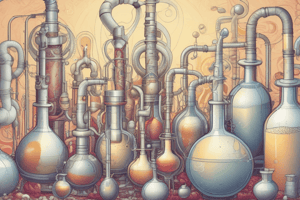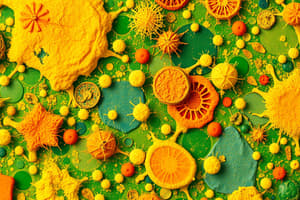Podcast
Questions and Answers
What is the most abundant organic substance on earth?
What is the most abundant organic substance on earth?
- Starch (correct)
- Protein
- Fat
- Carbohydrate
Where is starch primarily found in plants?
Where is starch primarily found in plants?
Roots, seeds, and tubers
What is a common use of starch in food?
What is a common use of starch in food?
Thickening
Which of the following are sources of starch? (Select all that apply)
Which of the following are sources of starch? (Select all that apply)
What are the two general types of starch?
What are the two general types of starch?
The process of separating starch from grains and tubers is called ______.
The process of separating starch from grains and tubers is called ______.
Modified starches are starches that have not been altered.
Modified starches are starches that have not been altered.
What are starches used for in processed meats?
What are starches used for in processed meats?
What nutrient groups do cereals provide the body with?
What nutrient groups do cereals provide the body with?
Flashcards are hidden until you start studying
Study Notes
STARCH
- The second most abundant organic substance on Earth.
- Primarily found in leafy green plants, specifically in roots, fruits, and grains.
- Accounts for up to 80% of calories consumed globally.
- Key food staples include rice, corn, cassava, wheat, and potatoes.
- Used across various industries including food manufacturing, cosmetics, pharmaceuticals, and textiles.
SOURCES OF STARCH
- Primary storage locations for starch in plants are seeds, roots, and tubers.
- Common sources include:
- Cereal grains (corn, wheat, rice, sorghum, oats)
- Legumes
- Roots and tubers (potato, sweet potato, arrowroot, cassava)
CLASSIFICATION OF STARCH
- Native or Natural Starch: Starches derived directly from their plant sources without modifications.
- Modified Starches: Altered physically or chemically to change properties; examples include:
- Pre-gelatinized starch for instant desserts.
- Modified starches in sauces and toppings that behave differently when heated or cooled.
- Purified Starch: Extracted from grains and tubers through processes like wet milling.
STARCH COMPOSITION AND STRUCTURE
- Composed of polysaccharides made up of a large number of glucose molecules.
- Two main fractions: amylose (linear structure) and amylopectin (branched structure).
THE STARCH GRANULE
- Starch granules are storage units in plants, particularly in seeds and roots.
- Composed of amylose and amylopectin arranged in structured layers around a central point called the hilum.
STARCH PROPERTIES AND REACTIONS
- Gelatinization: Forms a gel-like substance.
- Viscosity: Thickens when mixed with water.
- Retrogradation: Involves the absence of water molecules in starch.
- Syneresis: The secretion of water from gelatinized starch.
- Dextrinization: A color change during heating.
- Hydrolysis: The breakdown of starch enzymes into sugars through water.
CEREAL
- Cereal refers to any grain consumed as food; whole grains provide significant nutritional value.
- Recommended to include four servings of cereals daily; commonly used in pastries, sauces, puddings, and gravies.
FUNCTIONAL PROPERTIES OF STARCHES
- Acts as thickeners in sauces and gravies by absorbing water and forming gels.
- Functions as moisture retainers, gel-forming agents, binders, and flavor carriers by trapping oils and fats.
CEREALS IN FOOD PROCESSING
- Named after the Roman goddess of harvest, Ceres, with rice, wheat, and corn as the most significant types.
- Plays a crucial role in achieving the desired viscosity in processed foods.
CEREAL-PROCESSED FOOD
- Whole grain cereals retain nutrients from the unprocessed grain, containing bran, germ, and endosperm.
- Enriched cereals provide important vitamins like thiamine, niacin, riboflavin, and iron.
NUTRITIONAL SIGNIFICANCE OF NOODLES AND PASTA
- Composed of water, iron, protein, various vitamins (thiamin, riboflavin, niacin), fat, calcium, and phosphorus.
VARIANTS OF NOODLES AND PASTA
- Different types include macaroni, spaghetti, linguini, bihon, lasagna, chicken mami, and more.
PREPARATION AND COOKING OF STARCH AND CEREAL DISHES
- Factors influencing starch paste viscosity and gel strength include:
- Type and amount of starch used.
- Heating rate and endpoint temperature.
- Cooling and storage methods.
- Additional ingredients used in the recipe.
Studying That Suits You
Use AI to generate personalized quizzes and flashcards to suit your learning preferences.




